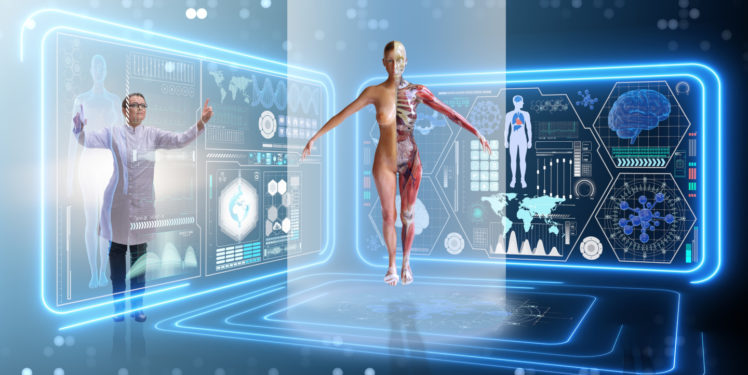Fraunhofer MED²ICIN lighthouse project
Medical data as the basis for personalized treatment and intelligent cost management
Point-and-click prevention, diagnostics and treatment: That is the vision behind the MED²ICIN lighthouse project. Digital twins have already been widely adopted in many industries. The development of digital models of patients has the potential to revolutionize the healthcare sector. The adoption of innovative digital solutions throughout the treatment process can improve patient care, and also pave the way for treatment that is more targeted, efficacious – and therefore more cost-effective.
 ©Elnur-Fotolia_Fraunhofer IGD
©Elnur-Fotolia_Fraunhofer IGD
The overarching goal of the MED²ICIN lighthouse project is to create a single, holistic digital patient model by merging all available information on an individual’s health and medical history. Data that were previously distributed across place and time in diverse systems – as analogue patient records or high-resolution CT scans, for example – are to be consolidated in a digital twin. This opens up enormous opportunities for improvements in the treatment of individual patients, and enables the more intelligent use of healthcare funds for society as a whole.
Better management of healthcare costs and resources entails technology-driven innovation for more effective prevention, diagnostics, treatment and care. There have already been attempts to leverage human medical data to the benefit of patients, to gain new scientific insights and to raise efficiency in healthcare. The MED²ICIN project goes substantially beyond existing approaches, such as electronic patient records and IBM Watson. Capturing, aggregating and intelligently analyzing personal health and medical-history data in compliance with data privacy requirements will result in an entirely new solution. This will focus on direct users (physicians, hospitals patients and researchers) and also on a number of commercial organizations (such as life-science companies and providers of healthcare IT and insurance).
With this aim in mind, seven Fraunhofer Institutes are joining forces for research. Their interdisciplinary skillset is the unique and essential basis for the development of digital twins of patients. In addition to deep specialist knowledge, above all in artificial intelligence, machine learning, knowledge extraction and modeling, data management and visualization, these institutes will be leveraging their understanding of clinical environments and guidelines, and of translational medicine.
The goal is to evaluate and implement a digital patient model prototype by applying it to chronic inflammatory bowel disease (IBD) and oncological disorders. Both diagnoses are associated with long and complicated treatments with correspondingly high costs. The MED²ICIN vision is to establish a digital twin of patients: Physicians can enter patient-specific data, to be analyzed on the basis of in-depth cohort knowledge, clinical guidelines and healthcare cost models. The result is data-driven support for decisions on the best treatment for the individual and intelligent healthcare cost management. Human-centric and user-friendly interaction design will ensure that data management and analytics findings are tailored to the specific user group, and can be easily incorporated into their work.
The four-year lighthouse project was launched in October 2018.
